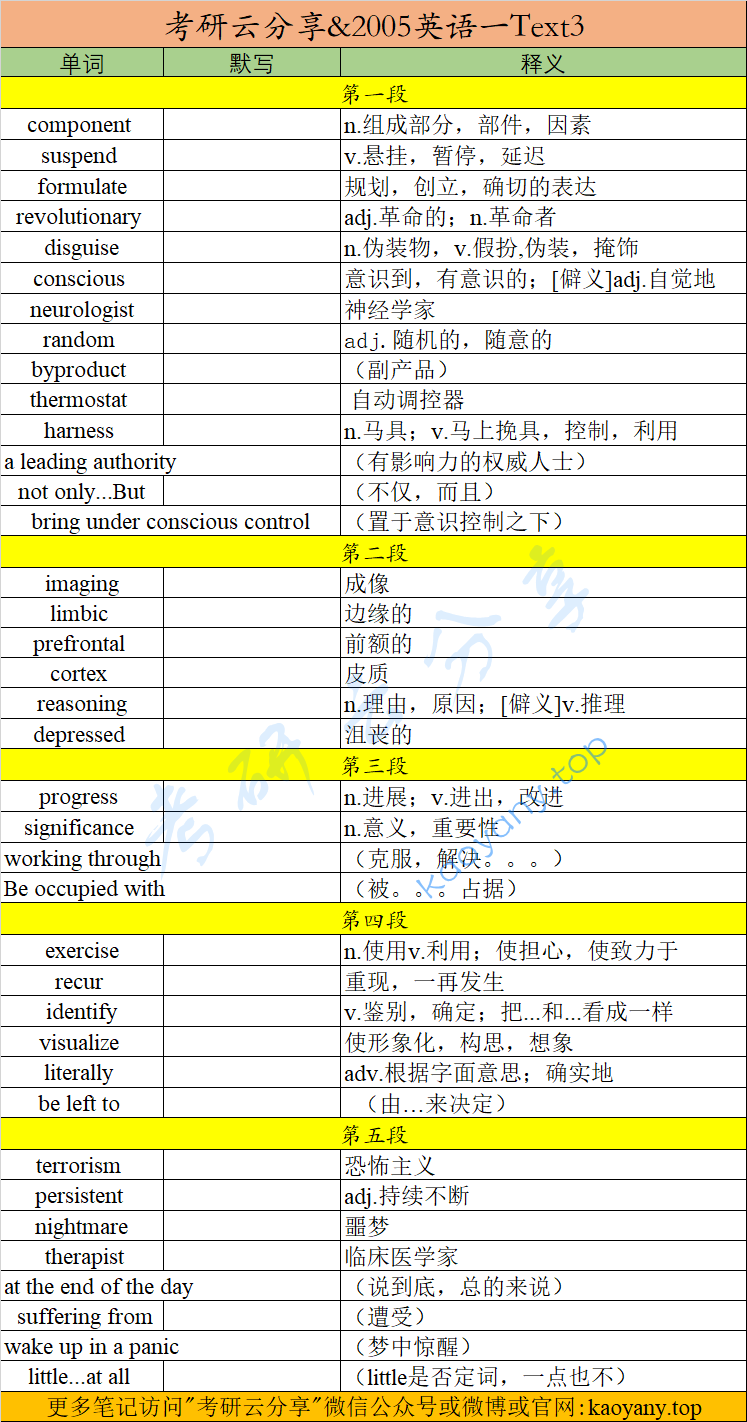第一段
Of all the components of a good night’s sleep, dreams seem to be least within our control. In dreams, a window opens into a world where logic is suspended and dead people speak. A century ago, Freud formulated his revolutionary theory that dreams were the disguised shadows of our unconscious desires and fears; by the late 1970s,neurologists had switched to thinking of them as just “mental noise”—the randombyproducts of the neural-repair work that goes on during sleep. Now researchers suspect that dreams are part of the mind’s emotional thermostat, regulating moods while the brain is “off-line.” And one leading authority says that these intensely powerful mental events can be not only harnessed but actually brought under conscious control, to help us sleep and feel better. “It’s your dream,” says Rosalind Cartwright, chair of psychology at Chicago’s Medical Center. “If you don’t like it, change it.”
单词&词组
component [kəmˈpoʊnənt] (出现5次)n.组成部分,部件,因素
suspend [səˈspend](出现3次)v.悬挂,暂停,延迟
formulate [ˈfɔːrmjuleɪt](出现5次)规划,创立,确切的表达
revolutionary ˌ[revəˈluːʃəneri](出现2次)adj.革命的;n.革命者
disguise [dɪsˈɡaɪz](出现3次)n.伪装物,v.假扮,伪装,掩饰
conscious [ˈkɑːnʃəs(出现8次)意识到,有意识的;[僻义]adj.自觉地,刻意的
neurologist [nʊˈrɑːlədʒɪst] 神经学家
random [ˈrændəm](出现5次)adj.随机的,随意的
byproduct [ ˈbaɪprɑdəkt](副产品)
thermostat [ˈθɜːrməstæt] 自动调控器
harness [ˈhɑːrnɪs](出现1次)n.马具,保护带;v.马上挽具,控制,利用
a leading authority(有影响力的权威人士)
not only。。。but(不仅,而且)
bring under conscious control(置于意识控制之下)
本段翻译
在一夜好觉的所有因素汇总,梦似乎是最无法控制的。在梦中,有一扇窗通向通向逻辑暂停,死人开口说话的世界。一个世纪以前,弗洛伊德创立了他的革命性的理论,那就是梦是人们无意识的欲望和恐惧所伪装的影子;到了20世纪70年代,神经学家转而把梦认为仅是“精神的噪音”——睡眠中持续进行的神经修复工作的随机副产品。如今,研究人员察觉到梦是大脑情绪调节自动调节系统的作成部分,当人的脑子瓦特的时候对情绪进行调整。一位有影响力的权威人士认为,这种异常重要的精神活动不仅能过被利用,事实上,还能将其置于有意识的控制之下,能够帮助我们睡得香,精神好。
第二段
Evidence from brain imaging supports this view. The brain is as active during REM (rapid eye movement) sleep—when most vivid dreams occur—as it is when fully awake, says Dr. Eric Nofzinger at the University of Pittsburgh. But not all parts of the brain are equally involved; the limbic system (the “emotional brain”) is especially active, while theprefrontal cortex (the center of intellect and reasoning) is relatively quiet. “We wake up from dreams happy or depressed, and those feelings can stay with us all day.” says Stanford sleep researcher Dr. William Dement.
单词&词组
imaging [ˈɪmɪdʒɪŋ] 成像
limbic [ˈlɪmbɪk] 边缘的
prefrontal [priˈfrʌntəl] 前额的
cortex [ˈkɔːrteks] 皮质
reasoning [ˈriːzənɪŋ] (常用词)n.理由,原因;[僻义]v.推理
depressed [dɪˈprest](出现3次)沮丧的
本段翻译
来自大脑成像的证据证实了这一观点。某博士说,大脑在快速动眼睡眠中——大多数清晰梦境出现的时刻,就和完全清醒一样活跃。但不是所有大脑都同等活跃,脑边缘系统异常活跃,然而前额皮层(思维和推理的中心)则相对安静。斯坦福睡眠研究员某博士说“我们从们高兴或是沮丧的梦中醒来,这些情绪都会伴随我们一天。
第三段
The link between dreams and emotions shows up among the patients in Cartwright’s clinic. Most people seem to have more bad dreams early in the night, progressing toward happier ones before awakening, suggesting that they are working through negative feelings generated during the day. Because our conscious mind is occupied with daily life we don’t always think about the emotional significance of the day’s events—until, it appears, we begin to dream.
单词&词组
progress [prə ˈɡres](出现18次)n.进展;v.进出,改进;[僻义]。。。转向。。。
significance [sɪɡˈnɪfɪkəns](出现10次)n.意义,重要性
working through(克服,解决。。。)
Be occupied with (被。。。占据)
本段翻译
在某诊所的病人身上显露出了梦和情绪的关联。大多数人似乎在在晚上入睡早期做更多不好的梦,在醒来前做一些开心的梦,这表明人们在梦里逐处理白天产生的负面情绪。因为我们有意识的的思维大脑被日常的事物占据,所以我们不能总是思考白天所发生的重大事件的情感意义,直到我们开始做梦才会出现。
第四段
And this process need not be left to the unconscious. Cartwright believes one canexercise conscious control over recurring bad dreams. As soon as you awaken, identifywhat is upsetting about the dream. Visualize how you would like it to end instead; the next time it occurs, try to wake up just enough to control its course. With much practice people can learn to, literally, do it in their sleep.
单词&词组
exercise [ˈeksərsaɪz] (出现8次)n.练习,习题;v.锻炼,训练;[僻义] n.使用,应用;典礼;v.利用;使担心,使致力于
recur [rɪˈkɜːr](出现2次)重现,一再发生
identify [aɪˈdentɪfaɪ](出现17次)v.鉴别,确定;把...和...看成一样(sth. with);支持(with);找到发现
visualize [ˈvɪʒuəlaɪz](出现4次)使形象化,构思,想象
literally [ˈlɪtərəli] (出现4次)adv.根据字面意思;确实地
be left to (由…来决定)
本段翻译
这一过程未必是无意识的,这个人认为人们可以对一再重现的恶梦进行有意识的控制。你一醒来,确定什么再梦中困扰你,想象你要如何使之结束;下次在做同样的梦时,尽量及时醒来以控制它的进程。多加练习,人们可以学会它并真的可以在梦这样做。
第五段
At the end of the day, there’s probably little reason to pay attention to our dreams at all unless they keep us from sleeping or “we wake up in a panic,” Cartwright says.Terrorism, economic uncertainties and general feelings of insecurity have increased people’s anxiety. Those suffering from persistent nightmares should seek help from atherapist. For the rest of us, the brain has its ways of working through bad feelings. Sleep—or rather dream—on it and you’ll feel better in the morning.
单词&词组
terrorism [ˈterərɪzəm] 恐怖主义
persistent [pərˈsɪstənt](出现5次)adj.持续不断
nightmare [ˈnaɪtmer](出现1次)噩梦
therapist [ˈθerəpɪst] 临床医学家
at the end of the day(说到底,总的来说)
suffering from(遭受)
wake up in a panic(梦中惊醒)
little...at all (little是否定词,一点也不)
本段翻译
总的来说,我们几乎没有理由关注我们做的梦,除非它们真的使我们无法安眠或是让我们从梦中惊醒。卡特赖特说恐怖主义,经济的不确定性和通常的不安全感已经增加了人们的焦虑。那些长期遭受噩梦折磨的人应该寻求专家帮助;而对于其他人来说,大脑有着自己处理坏情绪的方法。枕着忧虑入睡甚至入梦,早上醒来时你会感觉好很多。
5道题目
31.Researchers have come to believe that dreams.
[A]can be modified in their courses
[B]are susceptible to emotional changes
[C] reflect our innermost desires and fears
[D] are a random outcome of neural repairs
32. By referring to the limbic system, the author intends to show.
[A] its function in our dreams[B] the mechanism of REM sleep
[C] the relation of dreams to emotions
[D] its difference from the prefrontal cortex
33. The negative feelings generated during the day tend to .
[A] aggravate in our unconscious mind
[B] develop into happy dreams
[C] persist till the time we fall asleep
[D] show up in dreams early at night34. Cartwright seems to suggest that
[A] waking up in time is essential to the ridding of bad dreams
[B] visualizing bad dreams helps bring them under control
[C] dreams should be left to their natural progression[D] dreaming may not entirely belong to the unconscious
35. What advice might Cartwright give to those who sometimes have bad dreams?
[A] Lead your life as usual.
[B] Seek professional help.
[C] Exercise conscious control.
[D] Avoid anxiety in the daytime.
参考答案
ACDDA

- 单词 词组
- 本段翻译
- 单词 词组
- 本段翻译
- 单词 词组
- 本段翻译
- 单词 词组
- 本段翻译
- 单词 词组
- 本段翻译
- 5道题目
- 参考答案
